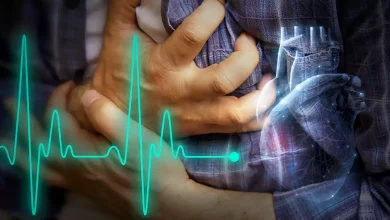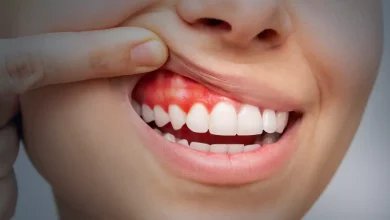All about Elephantiasis
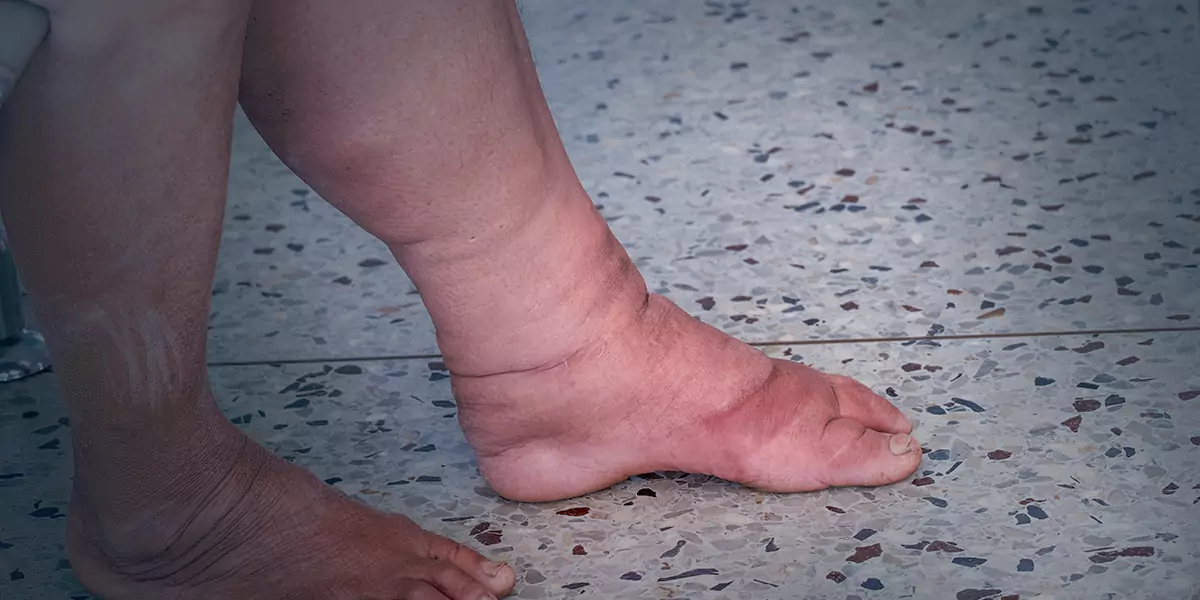
What is Elephantiasis?
Elephantiasis is also known as Lymphatic filariasis which is a condition where a part of the body especially the limbs abnormally swells because of being infected by parasites that are spread by mosquito bites. The other parts of the body which can be affected are the legs, genitals, breasts, and arms. The enlargement and swelling of the body parts can result in severe pain along with mobility issues. It got the name elephantiasis because the skin of the affected area becomes hard and thick like an elephant’s skin. This disorder is more common in tropical and subtropical areas.
What are the Symptoms of Elephantiasis?
A large number of people with this condition does not show any symptom in the start despite damage to the kidney and lymph system. Slowly symptoms can be visible as parts of the body start to swell because of the accumulation of fluids (lymphoedema).
Elephantiasis hinders the immune system from functioning properly, resulting in fever and chills, frequent skin infections and ulcers, and also making the skin hard and thick.
A few people may incur a blood disease known as eosinophilia, causing cough, shortness of breath, and wheezing.
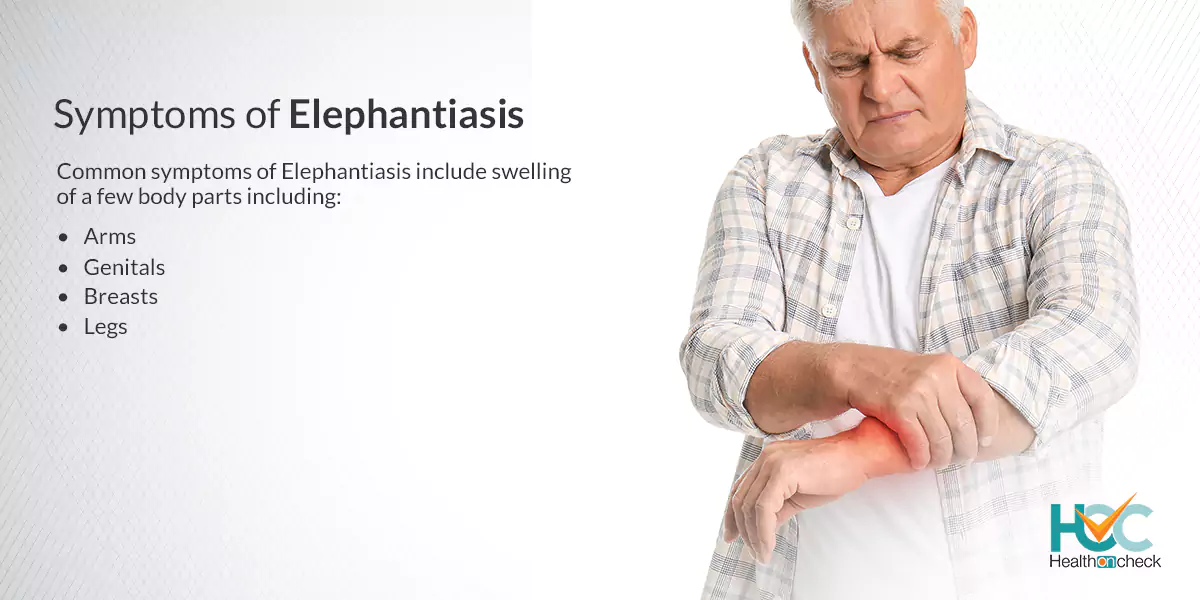
Common symptoms of Elephantiasis include swelling of a few body parts including:
- Legs
- Genitals
- Breasts
- Arms
Elephantiasis may make skin:
- Dry
- Thick
- Ulcerated
- Darker than usual
- Blemished
The affected areas not only swell but can result in pain along with becoming hard, thus the name elephantiasis. Those who have elephantiasis will have a weak immune function as their lymph system is damaged. They are also prone to various bacterial infections of the skin, leading it to become dry, thick, and ulcerated with repeated infections.
What are the Causes of Elephantiasis?
Parasitic worms which are spread by mosquitoes are the main cause of elephantiasis. The three types of worms that cause elephantiasis are:
- Wuchereria bancrofti
- Brugia malayi
- Brugia timori
The worms damage the lymphatic system in the body which is responsible for removing waste and toxins from the body. When it’s blocked, then it is not able to remove waste properly and results in the acculmulation of lymphatic fluid, which causes swelling.
Along with the parasitic worms, some other causes of elephantiasis may include:
Cancer: In some cases, the cancer cells block lymph vessels and cause an accumulation of lymphatic fluid thus resulting in elephantiasis.
Radiation: Radiation treatment for cancer can lead to scarring and inflammation of lymph nodes or lymph vessels.
Surgery: Surgery to remove cancer can also cause elephantiasis but it’s very rare and does not often occur.
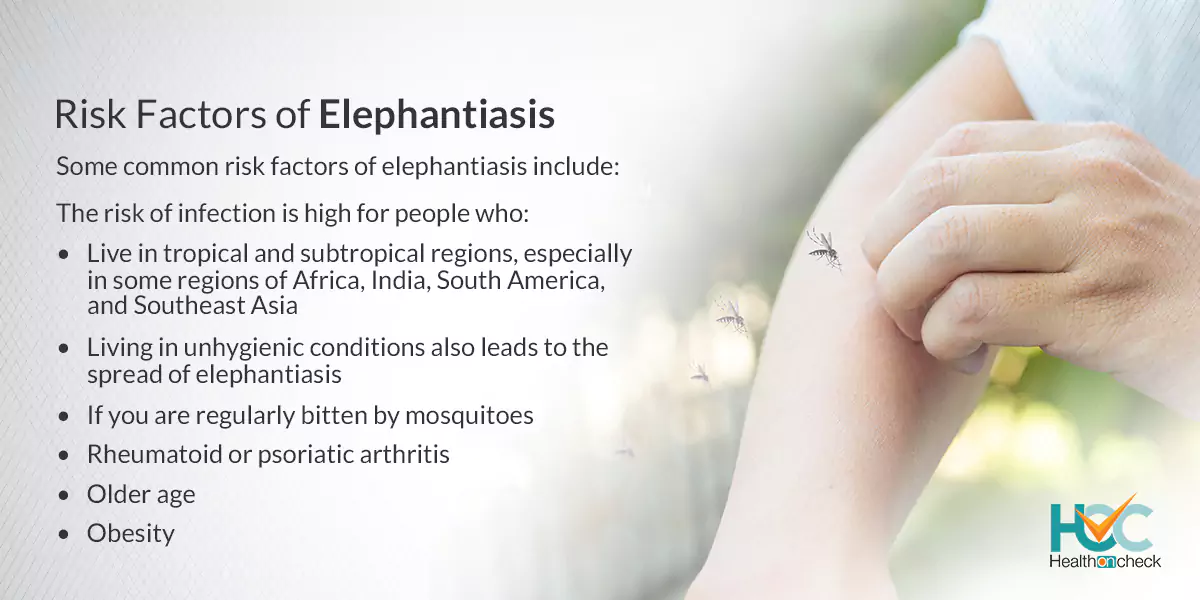
What are the Risk Factors of Elephantiasis?
Some common risk factors of elephantiasis include:
Elephantiasis can affect anyone who is exposed to the parasites that cause the disease.
The risk of exposure is greatest for people who:
- Live in tropical and subtropical regions, especially in some regions of Africa, India, South America, and Southeast Asia
- If you are regularly bitten by mosquitoes
- Living in unhygienic conditions also leads to the spread of elephantiasis
- Older age
- Obesity
- Rheumatoid or psoriatic arthritis
What are the Risk Factors of Elephantiasis?
Some common risk factors of elephantiasis include:
Elephantiasis can affect anyone who is exposed to the parasites that cause the disease.
The risk of infection is high for people who:
- Live in tropical and subtropical regions, especially in some regions of Africa, India, South America, and Southeast Asia
- If you are regularly bitten by mosquitoes
- Living in unhygienic conditions also leads to the spread of elephantiasis
- Older age
- Obesity
- Rheumatoid or psoriatic arthritis
What are the Complications of Elephantiasis?
Elephantiasis can lead to many physical and emotional complications, including:
Disability: Elephantiasis leads to permanent disability among people with the condition. They may find it difficult to move the affected body parts, resulting in working or engaging in household tasks quite difficult.
Secondary infections: Elephantiasis can lead to several fungal and bacterial infections because of damage to the lymph system.
Emotional distress: The condition can create emotional distress as people with elephantiasis may worry about their appearance, because of the swollen body parts which may lead to anxiety and depression.
How Elephantiasis is Diagnosed?
Your doctor will first go through your medical history, inquire about symptoms and perform a physical examination to diagnose this condition. Some tests may be prescribed to diagnose elephantiasis including:
Blood Tests: Blood tests are done to check parasitic infection in your blood. Blood tests are also important to check the presence of roundworms which are most active at night thus it’s important to collect the blood sample at this time.
MRI scan: An MRI uses a magnetic field and radio waves that produce 3D, high-resolution images of the involved tissue which are helpful to diagnose the problem.
CT scan: It’s an X-ray technique that creates detailed, cross-sectional images of the body’s structures and can reveal blockages in the lymphatic system.
Ultrasound: Here sound waves are used to produce images of internal structures which can help to find obstructions within the lymphatic system and vascular system.
Lymphoscintigraphy: During this procedure, a radioactive dye is injected into the infected person’s body and then scanned by a machine. The images it produces show the dye moving through the lymph vessels, highlighting blockages.
What are the Treatment Options Available for Elephantiasis?
Treatment for elephantiasis includes:
- Doctors may prescribe antiparasitic drugs, such as diethylcarbamazine (DEC), mectizan, and albendazole (Albenza) to treat this condition
- Antiseptic lotions/ creams are used clean the affected areas
- Caring for wounds in the affected areas by gently washing the swollen and damaged skin every day with soap and water
- Physical exercises based on a doctor’s directions
- In some extreme and rare cases surgery may be required, which may include reconstructive surgery to remove affected lymphatic tissue
- Emotional and psychological support may be required to deal with the emotional distress that may come with this condition
- Elevating swollen limbs to improve the flow of fluid and lymph
- Disinfecting wounds to avert secondary infection
Living with Elephantiasis
Living with elephantiasis can be disabling as at the time it becomes difficult to move the affected body parts, making it difficult to carry out everyday tasks. Even moving around in your house may be difficult. Along with physical problems, it may create mental problems also as you may start to get worried about how your condition looks to others which causes anxiety and depression. There are treatments available for physical problems and to deal with mental problems, you can join support groups along with taking counseling sessions. Sharing your thoughts and feeling with close friends and family members will also be of great help.
Whom to Consult?
If you notice persistent swelling in your arm or leg immediately consult with your doctor who may refer you to a specialist if he notices signs and symptoms of elephantiasis. A specialist will diagnose your condition and will start treatment accordingly. If you are already diagnosed with elephantiasis, see your doctor if there is a sudden dramatic increase in the size of the affected areas.

